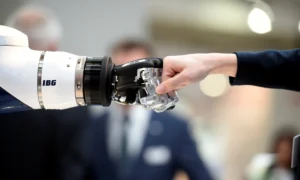Integration of artificial intelligence (AI) technologies in hospitality and tourism industries presents a plethora of diverse opportunities for businesses in either of the aforementioned and IT and telecommunications industries. Ability of AI technology-aided tools to carry out human functions regardless of the timing can help businesses such as restaurants, resorts, and hotels to optimize their business expenditure and provide around the clock service for their patrons. Players in global AI in travel and hospitality market are developing and designing products and services that can enhance the travel and vacation experience of travelers and offer them dynamic and attractive pricing deals. Adoption of advanced technologies such as facial and biometric recognition in airports for customs and immigration departments has created lucrative opportunities for market players. However, serious concerns regarding data privacy and digital data security can hamper the market growth in coming years. Integration of advanced and hassle free financial technologies can also present customers and companies with interesting solutions for various travelling problems.
Services in global AI in travel and hospitality market can be utilized for both professional or business travel as well as personal travel. Segregation of services within the global AI in travel and hospitality market by technology includes segments such as machine learning, chat bots or travel bots, big data, in person customer service, natural language processing or NLP, blockchain, data analysis, and virtual assistants. Forms of travel targeted by the players in global AI in travel and hospitality market include marine travel, road travel, air travel, and rail travel. Application areas served under the horizon of global AI in travel and hospitality market are travel applications and hospitality applications.
Request Brochure for AI in Travel and Hospitality Market Report
End-use industries that can benefit from the services in global AI in travel and hospitality market include hospitality industry, shipping industry, transportation industry, building industry, logistics industry, aviation industry, entertainment industry, and travel industry. The COVID-19 pandemic had a significant impact on the global AI in travel and hospitality market. Due to social distancing norms and travel restrictions, many places, towns, or attractions that compelled tourists from all over the world were forced to shut down. This resulted in slowing down of the business traction in tourism industry and directly affected players in global AI in travel and hospitality market.
Asia Pacific Expected to Witness Significant Growth in AI in Travel and Hospitality Market
Key regions operational in the global AI in travel and hospitality market are North America, South America, Asia Pacific, Europe, and Middle East and Africa. Asia Pacific region is anticipated to witness significant growth in global AI in travel and hospitality market in coming years owing to rapid development of tourism and hospitality related infrastructure including seaports, rail roads, hotels, highways, and airports in the region. Another essential driving factor for the growing Asia Pacific global AI in travel and hospitality market is increasing integration of advanced computational technologies such as blockchain, artificial intelligence aided software tools, and internet of things or IoT. Europe is another region anticipated to rise in global AI in travel and hospitality market in coming years owing to deployment of AI tools that aid travelers in various tedious tasks such as booking flight tickets, optimizing challenging traveling choices, booking hotel rooms, getting a comfortable travelling experience, and enhancing and simplifying the purchasing processes.
Players in AI in Travel and Hospitality Market Focused on Expanding Customer Base
Some of the most prominent players operating within the global AI in travel and hospitality market are mTrip, CRS Technologies, Sabre Corporation, Tramada Systems, Amadeus IT, Lemax, Navitaire, Travelport International, and Qtech Software. Inorganic growth strategies implemented by players in global AI in travel and hospitality market include mergers and acquisitions, collaborations, and strategic partnerships. Large players in the market are focused on acquiring or partnering up with small scale firms to enhance their service offerings and design new technologies that can effectively attract larger consumer base.
TMR offers custom market research services that help clients to get information on their business scenario required where syndicated solutions are not enough, request for custom research report



































